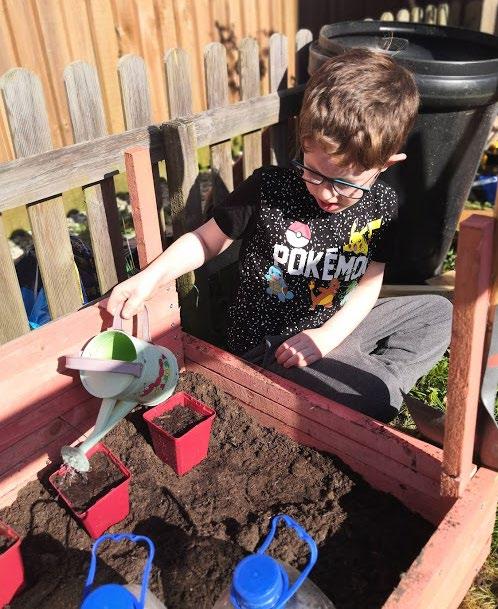12 | Play for Wales | Spring 2020
The therapeutic
superpowers of play We asked Child and Adolescent Psychotherapist and Play Therapist, Maggie Fearn to tell us about how playing can help children to make sense of their experiences and the world around them, particularly in times of uncertainty and stress. This is what Maggie had to say about the power of play.
Superpower 1: Play is the child’s preferred medium of communication Play therapists understand the superpowers of play. Play therapists call on these powers to connect with children in distress, to make them feel safe and to co-regulate them by providing sensory play materials that soothe and stimulate. Also, to give the child the space and the time to make sense of their experiences using the symbols and metaphors of imaginative and pretend play. A characteristic of play is the intensity, and absorption in the present moment. Children are preoccupied when they play, playful experiences are deeply impressive and what is more, if something happens to the child that is confusing, overwhelming or misunderstood the child will act it out symbolically in play to try to make sense of it, rearranging the experience in her own terms. For example: Ellie1 (aged four) has a stick, whacking a tree stump: ‘I’m getting the monster!’ ‘You’re getting the monster,’ I remark. ‘Green monster I saw when Mam went out. We watch Tom and Jerry before I go to sleep. Get the monster! It’s green!’ The tree stump becomes the monster. She whacks it hard, talking all the time, and I pay close attention, quietly tracking her every movement. She calms down and pokes the end of the stick into leaves and gives them to me one by one. ‘You’re giving me leaves,’ I say. She sticks the stick into the ground. ‘This is my stick, it stays here. No one else can use it.’ She then sits on the monster.
In her imaginative play Ellie actively confronts her terrors, and as brave as any mythical heroine she overcomes them. Children can act out their experiences in play to make sense of the world, using symbol and metaphor – this gives the therapist insight into understanding the underlying forces driving the child’s nonverbal and unconscious communication.
Superpower 2: Healing happens through play Children play whenever they can. Whilst playing, children grow and develop in all aspects: physically, emotionally, psychologically and cognitively. As children move through life, through play, they integrate their experiences in manageable narrative sequence, establishing neurobiological patterning, each developmental stage building incrementally towards maturity. Intrinsic learning happens at each stage, providing the foundation for what comes next. Trauma impacts on the flow of development, resulting in profound confusion and distress – the traumatised child is overwhelmed and cannot function to her full potential. Research into play deprivation reveals that children significantly deprived of opportunities to play are more likely to be aggressive, repress emotions, lack social skills and have an increased tendency towards obesity.2 Chronic, long term deprivation results in depression, withdrawal and decreased neuro-endocrine activity in the brain and nervous system.3 If children don’t play they suffer. Not all children need play therapy, but all children need to play. It is an unconscious, self-regulating process oriented towards independence, integration and health. Children who do need therapeutic help can find healing through play. As Ellie demonstrates, a child can manifest her fears as a green monster, which is also a tree stump, and act out her real and urgent need to rise up and









